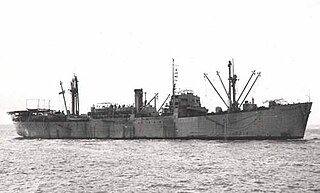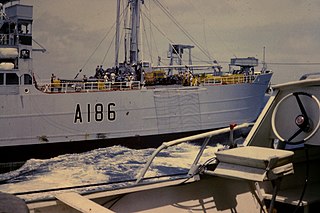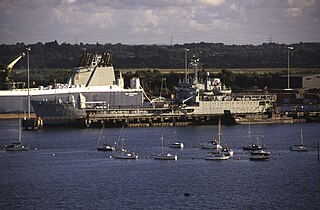
The Royal Fleet Auxiliary (RFA) is a naval auxiliary fleet owned by the UK's Ministry of Defence. It provides vital logistical and operational support to the Royal Navy and Royal Marines. The RFA ensures the Royal Navy is supplied and supported by providing fuel and stores through replenishment at sea, transporting Royal Marines and British Army personnel, providing medical care and transporting equipment and essentials across the world. In addition the RFA acts independently providing humanitarian aid, counter piracy and counter narcotic patrols together with assisting the Royal Navy in preventing conflict and securing international trade. They are a uniformed civilian branch of the Royal Navy staffed by British merchant sailors.

RFA Fort Austin is a retired British Fort Rosalie-class dry stores ship of the Royal Fleet Auxiliary.

RFA Fort Rosalie was the lead ship of her class of Royal Fleet Auxiliary fleet replenishment ships. Fort Rosalie was originally named RFA Fort Grange, but was renamed in May 2000 to avoid confusion with the now-decommissioned RFA Fort George, a change which was not universally popular. On 31 March 2021, the ship was withdrawn from service.
Three ships of the Royal Fleet Auxiliary have borne the name RFA Brambleleaf:
Three ships of the Royal Fleet Auxiliary have borne the name RFA Orangeleaf:

RFA Fort Charlotte (A236) was a stores issuing ship of the Royal Fleet Auxiliary.

RFA Fort Duquesne (A229) was an air stores ship of the Royal Fleet Auxiliary a Fort type ship.

RFA Fort Rosalie (A186) was an armament stores carrier of the Royal Fleet Auxiliary.
Three ships of the Royal Fleet Auxiliary have borne the name RFA Cherryleaf:
Three ships of the Royal Fleet Auxiliary have borne the name RFA Appleleaf:
Two ships of the Royal Fleet Auxiliary have borne the name RFA Olwen:
Three ships of the Royal Fleet Auxiliary have borne the name RFA Olna:
Three ships of the Royal Fleet Auxiliary have borne the name RFA Bacchus, after Bacchus, the god of wine in Roman mythology:

The Fort Victoria or Fort II class is a class of replenishment oiler of the Royal Fleet Auxiliary, a role that combines the missions of a tanker and stores supply ship. As such they are designated auxiliary oiler replenisher (AOR). They are tasked with providing ammunition, fuel, food and other supplies to Royal Navy vessels around the world. There were two ships in the class, Fort Victoria and Fort George; the latter being taken out of service and despatched for scrapping at a Turkish breakers as a consequence of budgetary cutbacks across the Royal Navy.

SS Fort Cataraqui was a North Sands-type Fort ship. The North Sands type, along with similar Park, Fort, and Canadian Liberty classes were essentially British and Canadian variants of the American Liberty and Victory classes. Fort Cataraqui is notable for being the first Allied ship to enter the port of Antwerp after the Canadian First Army cleared the Scheldt Estuary during the Battle of the Scheldt in the Second World War.

The Fort Rosalie or Fort class of fleet replenishment vessel of the British Royal Fleet Auxiliary were designed to replenish Royal Navy taskgroups with various armaments and victualling stores while under way. Unlike the bigger Fort Victoria class, they supply dry stores and not fuel. RFA Fort Rosalie was originally known as Fort Grange but was renamed in 2000 to avoid confusion with the new Fort Victoria-class replenishment oiler RFA Fort George. Both ships were withdrawn from service and placed up for sale in 2021.

Marchwood Military Port (MMP) or Marchwood Sea Mounting Centre (SMC) is a military port located in Marchwood, Southampton on the south coast of the UK, and the base of 17 Port & Maritime Regiment Royal Logistic Corps. The port was built in 1943 to aid in the D-Day assault on Normandy in 1944 and has since been used to support the Falklands War.

The bombing of RFA Fort Victoria took place on 6 September 1990, when a unit of the Provisional Irish Republican Army (IRA) planted two bombs aboard the Royal Fleet Auxiliary replenishment ship at Harland and Wolff shipyard in Belfast, Northern Ireland, where the vessel had been launched four months before. One of them exploded in the engine room, causing flooding and serious damage. The second device didn't explode and was defused several days later. The attack resulted in a two-year delay before Fort Victoria became fully operational.
A Fleet Solid Support Ship is a type of Royal Fleet Auxiliary (RFA) ship designed to supply solids, such as ammunition, explosives and food, to Royal Navy ships at sea. The term can also refer to the programme to replace the RFA's existing solid support ships, the Military Afloat Reach and Sustainability (MARS) Fleet Solid Support (FSS) programme.
This page is based on this
Wikipedia article Text is available under the
CC BY-SA 4.0 license; additional terms may apply.
Images, videos and audio are available under their respective licenses.










